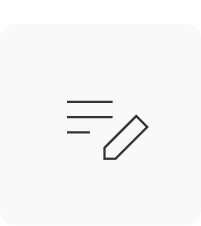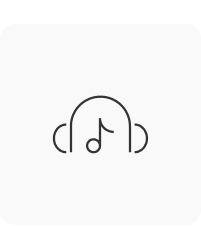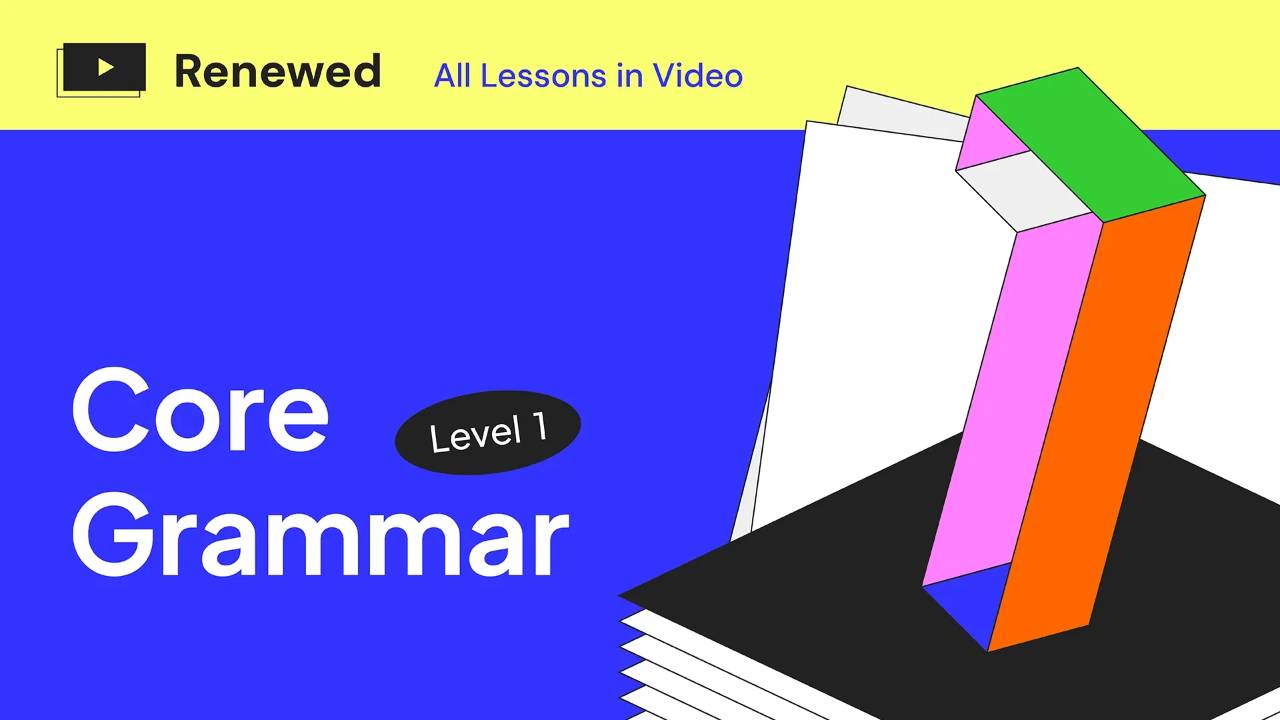"Take Your First Step into Korean Learning!"
Main topics of the Level 1 course:
- Basic greetings
- How to count numbers in Korean
- Basic grammar for forming your first Korean sentences
- Present and past tense
- How to say "who", "why", and "how" in Korean
Table of Contents
![]() Average lesson length: 13 minutes
Average lesson length: 13 minutes
Lesson 1. Hello. Thank you. / 안녕하세요. 감사합니다.
Lesson 2. Yes. No. What? / 네. 아니요. 네?
Lesson 3. Good-bye. See you. / 안녕히 가세요. 안녕히 계세요. 안녕.
Lesson 4. I’m sorry. Excuse me. / 죄송합니다. 저기요.
Lesson 5. It’s me. What is it? / 저예요. 뭐예요?
Lesson 6. What is this? This is … / 이거 뭐예요? 이거…
Lesson 7. This, That, It / 이, 그, 저
Lesson 8. It’s NOT me. / 아니에요.
Lesson 9. Particles for Topic and Subject / 은, 는, 이, 가
Lesson 10. have, don’t have, there is, there isn’t / 있어요, 없어요
Lesson 11. Please give me. / 주세요.
Lesson 12. It’s delicious. Thank you for the food. / 맛있어요. 잘 먹겠습니다. 잘 먹었습니다.
Lesson 13. I want to … / -고 싶어요
Lesson 14. What do you want to do? / 뭐 하고 싶어요?
Lesson 15. Sino-Korean Numbers / 일, 이, 삼, 사
Lesson 16. Basic Present Tense / -아요, -어요, -여요
Lesson 17. Past Tense / -았/었/였어요 (했어요)
Lesson 18. Particles for Location / 에, 에서
Lesson 19. When / 언제
Lesson 20. Native Korean numbers / 하나, 둘, 셋, 넷
Lesson 21. Negative Sentences / 안, -지 않다
Lesson 22. 하다 verbs
Lesson 23. Who? / 누구?
Lesson 24. Why? How? / 왜? 어떻게?
Lesson 25. From A To B, From C Until D / -에서/부터 -까지
Review What You’ve Learned in Level 1
Why you'll LOVE our Essential Korean Curriculum
All Levels Covered Short and Digestible Lessons Fun Story-based Reviews Review Quizzes and Interactive Audio Lessons
By simply following our curriculum that covers 10 levels, you can take your Korean skills from absolute beginner all the way up to advanced.
Each lesson is bite-sized and easy to understand, as it focuses on one grammar point at a time and provides many example sentences.
You can review the entire course through a fun story! The final lesson of each course features a fun story that allows you to review all the grammar and vocabulary introduced in the course.
You can test your new knowledge through review quizzes and interactive audio lessons, where our teachers ask you questions, and you can respond and check where you need to improve.
Who teaches this course?


What you can find in this course:

Lesson notes

MP3 file

PDF file

Sample dialogues

Sample dialogues

Review lesson
[Updated] Learn to Read and Write in Korean (Hangeul)![]()
#Hangeul #KoreanLetters #AbsoluteBeginners
How Korean Sentences Work![]()
#KoreanSentences #Grammar #Beginner
30 Essential Korean Adjectives For Beginners![]()
#KoreanAdjectives #Vocabulary #Beginner
20 Essential Korean Phrases For Beginners![]()
#KoreanPhrases #Speaking #Beginner
Level 1 Textbook ![]()
Level 1 Workbook ![]()
Level 1 Textbook & Workbook Package ![]()
More courses & books you might also like
[Updated] Learn to Read and Write in Korean (Hangeul)![]()
#Hangeul #KoreanLetters #AbsoluteBeginners
How Korean Sentences Work![]()
#KoreanSentences #Grammar #Beginner
30 Essential Korean Adjectives For Beginners![]()
#KoreanAdjectives #Vocabulary #Beginner
20 Essential Korean Phrases For Beginners![]()
#KoreanPhrases #Speaking #Beginner
Level 1 Textbook ![]()
Level 1 Workbook ![]()
Level 1 Textbook & Workbook Package ![]()






hola, alguien me puede ayudar, no puedo recordar por que 해야 되다 su terminación ” dwae-yo” 저는 뭐 해야 돼요? cuando es una pregunta. Esta es del level 2 lesson 20
Hola, no se si entendi bien tu pregunta. Pero el verbo 되다 se conjuga a 돼요 en presente. ( 되 + 어 + 요 -> 돼요). Cuando es pregunta se queda la misma conjugacion pero con tono ascendente al final.
안녕하세요 선생님 👐 I have a question . Is this sentence correct 👉 저는 책을 사는 것을 책을 읽는 것보다 더 좋아해요
I’m a student too but I think the right way to say is
저는 책을 사는 것보다 책을 읽는 것 더 좋아해요
I’m a student, but i will try to help…
I understood “I like to buy books more than i like to read books”. If that was what you meant, then it is correct, i guess. Because it’s totally comprehensible.
🙂
Thank u for answering 🙂 that was what i meant
안녕하세요 여러분~ 👋 저는 크리스입니다. 서른두 살이에요. 잘 지냈어요?
I’ll start Lvl2 tomorrow morning 09/08/2020. If someone’s interesting we can study together. Note/voice messages for pronunciation exercise and pass lessons reviews. GMT+3 is my time zone for the next 2 months. My Kakao ID is ChrisMaris. I can speak Greeks and English. 감사합니다 🙏
I have a study group on instagram! Anyone who is interested please dm me @kpop.viee
Hola, también lo comenzaré, ¿Podemos estudiar juntos?
Aclaro que no me fue bien con el nivel pasado, pero podemos hacerlo juntos, así aprendemos más rápido(?
Hi TTMIK! I was just wondering if someone can please tell me, from level 17 when saying can/cannot, if the verb ends in ㄹ do you have to add 을 수 etc… or would you just add 수 etc… like you would if you were conjugating the future tense. Thank you for the fantastic lessons!
I am also looking for someone to study with if anyone is interested. I am just over half way through level 2! 🙂
If a word ends in 받침(final consonant), you should add 을 수 while you should add ㄹ수 if it doesn’t end in 받침.
1. 참다(To stand/endure) ->참+을 수+없다-> 참을 수 없다(can’t stand/endure)
2. 넣다(To put) ->넣+을 수+없다-> 넣을 수 없다
3. 하다(To do) ->하+ㄹ수+없다-> 할 수 없다(can’t do/not able to do)
4. 구하다(To find/look for) ->구하+ㄹ수_없다-> 구할 수 없다
hi, for the grammar “ABLE TO DO SOMETHING” ( VERB<을 수 있다/없다 ) for words ending with batchim ex: 먹을 수 있어요.... (VERB< ㄹ 수 있다/없다) for words with no batchim ex: 갈 수 있어요....
just add 수 etc. on it
저와 공부고 싶어요?
If anyone is down lrt me know. I’m also a beginner, I speak Spanish as well ha ha.let me know email me if you want [email protected]
I have a study group on instagram! Anyone who is interested, please dm me @kpop.viee
I can understand the conversation in Level 1 but the conversation in Level 2 is so difficult :3 just understand some sentences in it :v I guess there are too much grammar to learn in Level 2
IMO the use of 이번 (this), 일본 (Japan), 일하다 (to work), 일요일 (Sunday), etc. made the level 2 dialogue ridiculously confusing for a learner at this level. Those are vocabulary words, not grammar points, but the fact that they’re all practically homonyms makes the dialogue unnecessarily difficult. I’ve advanced many levels ahead now but I STILL remember how heartbroken and ready to give up I was when I’d spent so much time studying level 2, was acing all the quizzes, but was initially just baffled by this dialogue b/c of the unnecessarily confusing vocabulary they chose to use
I have a study group on instagram, maybe we can practice together!!! Please dm me @kpop.viee if anyone is interested!
same here
Hello TTMIK I’ve just finished Level 2 lesson 19 and i have a question ‘요즘 공부하는 것은 한국어예요 and 요즘 저는 한국어를 공부해요’ is it the same?? I’m really confused. Thanks
Yes, it’s the same. where the first sentence literally translates as “recently, the thing that I am studying is korean”, while the second is “Recently, I am studying korean
Hi! I heard the word “않은데” today which means no, but I can’t seem to find the conjugation of this word or if it’s not a conjugated word. I’d really appreciate if somebody could answer this
it’s a conjugation with the use of 그런데 which means however or but
I think that’s the -은/는 데 grammar pattern. It has a confusing usage and I’m not 100% on it but from what I know I think it’s something along the lines of “even though”, or for setting up information for the next clause. It’s covered in Lesson 76 on howtostudykorean.com, I’m not sure what TTMIK level it’s on.
(correct me if im wrong) I think the first one is “What I am studying these days is Korean” the other one is These days, I study Korean” but it’s kinda same
Yes it is! 😉
Im starting level 2 today and im just wondering if someone can help me out with Korean? and be like study buddys?
I’ve been wanting a study buddy for a while because it’s hard to practice by myself and I need motivation. My instagram is @sterlingdullaghan. Let’s talk. 🙂
Let’s make a group chat in insta 😀 @jaeinchaaan
G
heyy would you like to be my study buddys? dm me on instagram @kazkinanti
Hey metoo
Me! I’m starting today too!
meeee tooo
Hi everyone! I am on intermediate level and have studied in Korea. I am currently brushing up my Korean and are looking for study buddies as well. We can make a group too so we can practice together. If anyone is interested, please email me at [email protected]. Thanks!
Me I dont know what am doing
Hi ! I can be your study buddy \(^▽^)/ you can text me on instagram @japanesgrandma
Hi !! I’m also starting this level and I’d love to have someone to talk to and practice with!
Hey metoo….we can chat. Im also studying 😅
tienes alguna red social tal vez instagram para intercambiar ideas?
Me too, I just started it today.
Me too!! I just started today!
Hi there! Me too ! I just started today !
hii! im starting level 2 soon as well and am also looking for a study buddy! 😀 if you’re interested e-mail me at [email protected]
hi everyone its anyone can explain whats the function or meaning ‘거예요’ in this sentences ‘그건 전 남자 친구 한테서 받은 거예요’?
I guess 거예요 there means like the function 은/는 것, but it drops the ㅅ ending consonant. So its literal translation is “That is something that I received from my ex boyfriend”
It usually refers to the future tense conjugation, that is “I will” do something or I am about to do something. I hope it helps
For lesson 11;
당 신 은 많 이 유 명 한 이 에 요. 😊
hi everyone, i’ve just finished level 2 lesson 6, there is question why in this sentence ‘어제 까지는 친구 였어요. 그런데 오늘 부터는 애인 이에요.’ why is written ‘였어요’ not ‘았어요 or 었어요’??thnaks before 🙂
Hello~ if i’m not mistaken “였어요” is
also the same as “이었어요” which is also a conjugation of “이다”. I think is/are is used in the sentence that’s why they used “였어요”
(I’m not sure tho☺️)
hii rain, thanks for ur information 🙂
maybe to make easier to say instead of 이었어요 perhaps 이였어요 maybe well guess, same as verb 차이다 for past tense 차였어요…
I’ve just finished Level 1 and I’m a little bit confused, because I have a feeling, that I’m not moving anywhere. I guess I need some advice and I need practice so so much! If you feel the same or want to study together my KakaoTalk ID is JackAleks.
oooh can i practice with you too? i just finished level one too a day ago!
Me too
Hi!! I finished level one a few days ago and I’m just starting this level as well and I’d love to have someone to talk and practice with!
Hiii, we could practice and talk about it!! 🙂
Just finished Level 1 and will start Level 2 this week. So happy.Thank you TTMIK!
Thank you for studying Korean with us! ^^
For lesson 10;
어 제 처 는 차 고 있 었 어 요 그 런 데 오 늘 한 국 어 공 부 하 고 있 어 요.
If you want a study buddy, text me at @ssgmila on Instagram, I would be happy to make friends with you!
nooo i cant open the pdf for lesson 11
message me hello in korean at keb.31 on instagram if you need a study buddy. I just started level 2! I am also an army and moa <3
Near finishing level 2..love to have a study buddy too.. Army as well💜😘can’t find your insta..
I just finished level 2 🔥🔥
Same! Would you like to study together?
same… if you want to study together you can add me on disocrd (_shiri#8577) … I also want to practice with others:)
too*
aaaagggghhhh i hate the sample sentences so much they talk to fast
I agree. I do wish they would speak a little bit slower. We don’t speak that fast in my country ㅋㅋㅋ
I just finished lesson 2.03, and was wondering if i wrote this sentence correctly. Please correct me if I’m wrong💗
어제 저는 정말 피곤한, 그래서 저는 이런 잤어요.
Do I need to put a marking particle somewhere? Like maybe behind 피곤한 or something??
어제 저는 정말 피곤했어요. 그래서 저는 일찍 잤어요. -> This sentence sounds more natural.
(I was so tired that I went to bed early). For your information, you should say 피곤했어(I was tired) or 피곤해(I’m tired) to finish your sentence. Besides, we don’t use this expression of 이런 잤어요. That’s why I changed 이런 into 일찍(early). Hope this helps.
I guess you may need to add the ending verb for 피곤한 to become “피곤했어”. Or you can conjugate both sentences and become “어제 저는 정말 피곤했서 이런 잤어요”
So I finished lesson 2
Here are sample sentences I hope correct:
1.언재 한극어 공부했어요?
한극어를 언재 공부했어요?
2.내일 학교 올거예요?
학교를 내일 올거예요?
Fighting to all students!! ^__^
1. 언제 한국어 공부했어요? 한국어를 언제 공부했어요? (natural)
2. 내일 학교 올 거에요? (natural) 학교를 내일 올 거에요? (unnatural)
Hope you find this helpful! ^^
As for the 2nd sentences it will be convenient to use 에 as 학교 is a place . You can use object marking particle when you want to do something with the noun for example ” 가방을 사고 싶어요 ” , ” 영화를 봐요 ” and etc . And the 1st sentecne is correct .
a great lesson and i just finished lesson 2! anyone who wants someone to talk and dabble with in Korean, you can talk to me in KakaoTalk. Let’s learn together! My kakaoID is ponkandelight <3 thank u sm!!!!!
Let’s learn together!
should i be worried if i couldn’t understand the girl in lesson 4
Hi peeps, I’m a young adult looking for other adults to learn Korean with! My goal is to take a Korean proficiency test in ~6 months time, and I’m dedicating about 4-5 hours towards Korean a day. Add me on discord (Schenze#1166) if you’re interested, and leave a short intro if you don’t mind! 18+ only please!